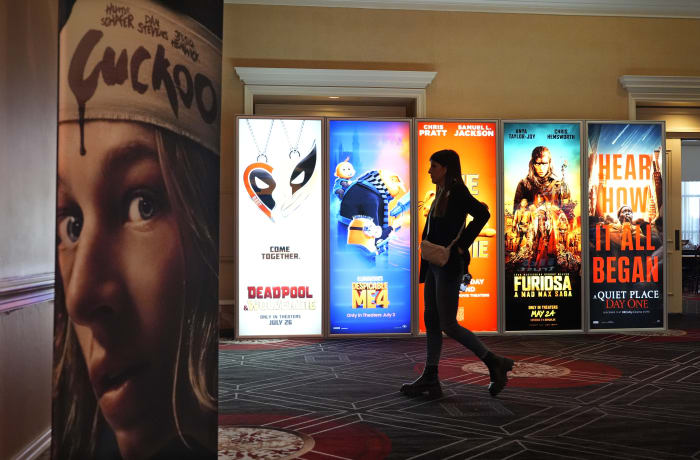LAS VEGAS – Movie theater owners are still feeling the high from “ Barbenheimer.” The counterprogramming of “Barbie” and “Oppenheimer” brought audiences to cinemas around with the world, ultimately earning nearly $2.5 billion in combined ticket sales. But, gathered in Las Vegas this week for the annual CinemaCon convention and trade show, they’re also acutely aware that they need more than two movies to survive.
“It is not enough to rely solely on blockbusters,” said Michael O’Leary, the president and CEO of the National Association of Theater Owners. “To have a truly successful filmed entertainment industry, a variety of movies that appeal to movie goers is critical.”
That means, O’Leary said Tuesday, “a strong and vibrant market for movies with smaller or medium sized budgets.”
At CinemaCon, Hollywood studios, exhibitors and tech companies come together to preview what’s next in moviegoing, from the films that they hope will get audiences to the theaters to the latest and greatest in snacks, seating and projection. On stage, the message is (by design) optimistic about the future of cinemas and the industry’s capacity for evolution. Whether it’s streaming, piracy, VHS or television, the leaders in the filmed entertainment industry are always quick to remind that their business has survived its share of existential crises: Someone is always forecasting its demise.
O’Leary made a plea to “our friends in the financial industry” to invest more capital into the system, calling it a “smart investment” that benefits “creatives, studios, exhibition, local communities and, most importantly, movie fans.”
“We know that a movie that begins its journey with theatrical exclusivity is more successful in every subsequent ancillary platform,” he added. “This should appeal to people who want as many film fans as possible to see their movies, but also to people that want to make money.”
Studios including Warner Bros., Universal Pictures, Paramount, Disney and Lionsgate will all take the big stage at Caesar’s Palace to show new trailers or footage from their biggest upcoming films, from “Furiosa” to “Deadpool & Wolverine,” sometimes with the help of movie stars, to stoke excitement in the people who will put these films in their theaters.
2023 was a rollercoaster year for movie theaters. The overall box office was up 20% from the previous year in the U.S., surpassing $9 billion. But that’s still $2 billion shy of where the business was pre-pandemic. There were hits, like “Oppenheimer” and “Barbie,” of course, and other notable successes from traditional studios, like “The Super Mario Bros. Movie,” “Spider-Man: Across the Spider-Verse,” “Wonka” and “Guardians of the Galaxy Vol. 3.” There were surprises like “Five Nights at Freddy’s” and “Cocaine Bear” and sleepers like “Anyone But You.”
There were also moments of successful innovation, including Taylor Swift and Beyoncé’s groundbreaking partnership with AMC Theaters to release their concert films, circumventing traditional studio middlemen. “ Taylor Swift: The Eras Tour ” made over $260 million worldwide, making it the highest grossing concert film of all time. Toho studios also self-distributed its first film ever, with “Godzilla Minus One,” which made over $114 million worldwide even with a limited release in the U.S.
But there were flops and disappointments too, and some of the tried-and-true genres like superhero movies proved to no longer be the industry supporting tentpoles that they once were. Streamed entertainment continues to be a formidable competitor for eyes and dollars as everyone continues to recover from the pandemic. In 2024, theater owners and studios are also having to grapple with a changed and somewhat depleted pipeline of films following the work stoppage caused by the dual Hollywood strikes.
But O’Leary said that a “great reimagination” is underway.
“Inflection points like these are moments of opportunity,” he added. “And this last year has shown me that the future of this industry—indeed, the state of this industry—is limitless.”
Charles Rivkin, the chairman and CEO of the Motion Picture Association, talked about the importance of film productions in the U.S., which he said “bolster communities” and account for 2.74 million American jobs. He also made an impassioned plea to combat piracy, which he said costs theaters more than $1 billion at the box office, and hopes to work with Congressional leaders to put for “site-blocking” legislation.
Rivkin closed by quoting best documentary winner and AP journalist Mstyslav Chernov’s Oscars speech from earlier this year, in which he said that “Cinema forms memories and memories form history” while accepting the statuette for “20 Days in Mariupol.”
Chernov’s words, Rivkin said, “Reminded us of the power and impact of what we do.”
Copyright 2024 The Associated Press. All rights reserved. This material may not be published, broadcast, rewritten or redistributed without permission.





